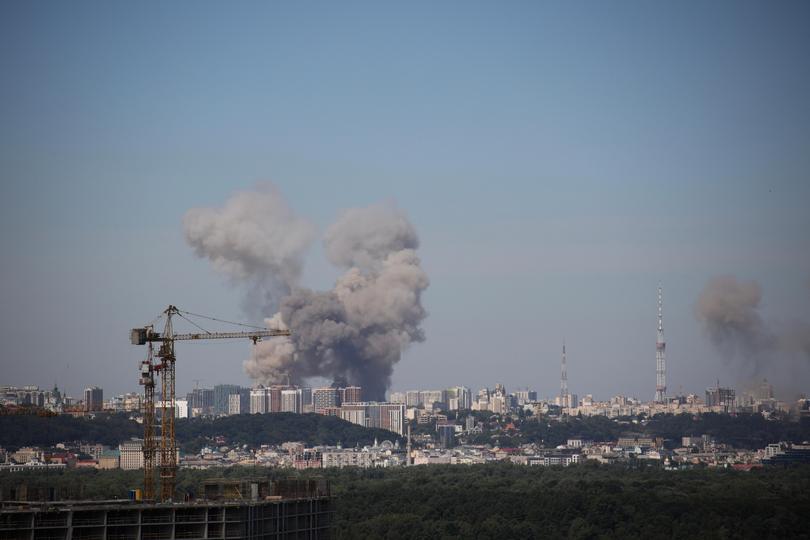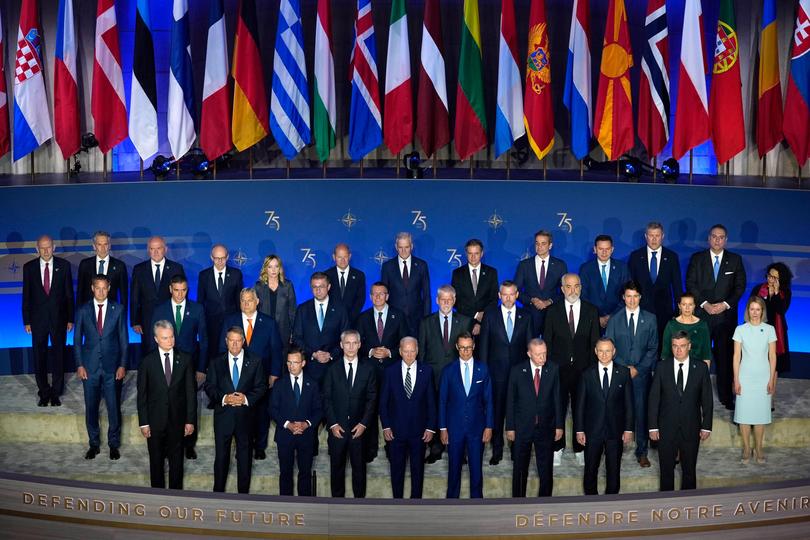The Washington Post: NATO vows lasting support for Ukraine but won’t promise membership
The fired-up US President told the summit celebrating the 75th anniversary of NATO that Ukraine will remain a free country. Whether that country becomes a member of the alliance is another matter.
NATO nations will provide Ukraine urgently needed air-defence systems, a strident President Joe Biden has declared, vowing aid to shield against deadly Russian attacks even as the alliance stops short of offering Kyiv concrete advances toward membership.
The US leader, kicking off a summit marking the 75th anniversary of NATO, said the donation of five air-defence systems by Germany, Italy, Romania, the Netherlands and the United States represented just one element of NATO’s ongoing campaign to help Kyiv hold off a far larger, better-armed adversary.
“Make no mistake; Russia is failing,” Mr Biden said. “The war will end with Ukraine remaining a free and independent country.”
Sign up to The Nightly's newsletters.
Get the first look at the digital newspaper, curated daily stories and breaking headlines delivered to your inbox.
By continuing you agree to our Terms and Privacy Policy.The immediacy of Ukraine’s needs was starkly apparent Monday when Russian missiles slammed into a pediatric hospital in Kyiv and other sites, killing dozens in an attack involving dozens of missiles, some of which evaded Ukrainian defences.
While alliance leaders are expected to unveil other steps to train and arm Ukraine at this week’s gathering, the modest package of expected deliverables underscores questions about whether Kyiv’s Western backers can help it prevail in a grinding war for survival.
Russia has managed to defy a barrage of Western sanctions imposed following President Vladimir Putin’s 2022 invasion, instead surging troops and military production in its quest to cement control over vast swaths of Ukraine.
Leaders of the alliance’s 32 nations, who descended upon the US capital ahead of the multiday summit, are attempting to refocus attention away from Ukraine’s gloomy battlefield outlook by highlighting ongoing alliance support for Kyiv. For Mr Biden, the summit is a moment of intense scrutiny as he faces pressure over his readiness to serve another four years.
NATO Secretary General Jens Stoltenberg sought to cast the stakes of the Ukraine conflict in historic terms, saying the opponents of democracy would benefit if Western nations did not make good in backing Kyiv’s fight.
“There are no cost-free options with an aggressive Russia as a neighbour; there are no risk-free options in a war,” he told leaders of the 32-nation summit. “Remember the biggest cost and the greatest risk will be if Russia wins in Ukraine; we cannot let that happen.”
Against the backdrop of Ukraine’s struggle to sustain its military effort - along with European anxiety about the potential for upheaval under a second Trump presidency and a rise in far-right parties in some alliance members - NATO leaders are expected to approve a shift from US to NATO control elements of the effort to arm and train Ukraine, and other measures officials are depicting as a “bridge” to Ukraine’s future accession to the alliance.
More direct action to admit Ukraine, such as setting a timeline for entry, remains a contentious subject among NATO members, some of whom fear absorbing a country mired in conflict with a nuclear superpower.
Ivo Daalder, who served as US ambassador to NATO during the Obama administration, said the new support constituted a “significant step forward” that would thrust the alliance more directly into the day-to-day actions supporting Ukraine’s military effort.
“It does bring Ukraine and NATO closer together on the practical and operational sense,” Daalder said. “What it doesn’t do is solve the strategic issue, which is: When will Ukraine become a member of NATO?”
Officials were still racing to finalise the summit’s communiqué Tuesday as the summit got underway. The latest proposal would offer Ukraine an “irreversible” path toward NATO membership, but it would also include extensive language about the need for Kyiv to make anti-corruption and good governance changes before it can join, 12 officials familiar with the conversations said, some of whom spoke on the condition of anonymity to discuss ongoing negotiations.
That language was the result of an agreement struck by Andriy Yermak, Ukrainian President Volodymyr Zelensky’s chief of staff, and US national security adviser Jake Sullivan, the officials said, one that reflected Mr Biden’s ongoing reservations about Ukraine’s path to NATO membership.
NATO members that favour a faster membership track for Ukraine had sought to include the word “irreversible” to demonstrate that Kyiv has moved closer to alliance entry since last year’s summit in Vilnius, Lithuania. Some acknowledged that the word was more symbolic than substantive.
Mr Biden, who has remained more resistant on the subject than many of his senior aides, initially rejected the plan to include the irreversibility language and declared in more than one Oval Office meeting that much work remained to be done to combat corruption before Ukraine could gain membership, two US officials and one former official said.
In an interview in May, the president said he was “not prepared to support the NATOization of Ukraine,” appearing to rule out the country’s membership altogether and contradicting the US government’s official stance.
Mr Biden continued to express scepticism in talks with Mr Stoltenberg in Washington last month, the officials said, saying the more cautious “bridge to NATO” language US officials were already using would suffice.
When Biden’s top advisers once again pitched the president on the “irreversible” wording after the Stoltenberg talks, Mr Sullivan was able to secure his support on the condition the United States would also require language citing the need for Ukraine to make extensive progress on corruption and political accountability before gaining membership, the officials said. Even so, Mr Biden agreed only to say that Ukraine’s path to “Euro-Atlantic integration” was irreversible, officials said.

That led some NATO countries, especially Eastern European states that border Ukraine and Russia, to object. Secretary of State Antony Blinken did a last-minute round of work to convince Mr Biden to get on board with stronger language - adding “NATO membership” to the list of things that are irreversible - then securing the agreement of allies to go along with the plan, officials said.
The discussions were a sign of Mr Biden’s concern that admitting Ukraine before it is ready could eventually saddle the alliance with corruption challenges that would be hard to root out, the officials said.
“Ukraine is not a teeny-tiny Balkan country that we’re talking about,” one official said. “It’s huge and it will have a sizable impact.”
NATO diplomats said that while Mr Biden’s approach is backed by Germany as well as some southern and western European members, it has also led to frustrations among others - particularly France and some eastern European countries - that the conditions risk conveying a message that the alliance would rather Ukraine not join at all.
Even if Ukraine were to solve all of its corruption problems tomorrow, there is a more fundamental challenge with inviting the country into NATO now, said Eric Ciaramella, a fellow at the Carnegie Endowment for International Peace and former White House aide with the Eurasia portfolio.
“The real issue is we don’t know how to provide a security guarantee to a country that’s at war with Russia,” he said. “We can’t articulate the conditions (for such a guarantee) other than for the war to be over, and saying that would just incentivise Russia to continue the war.”
For now at least, top Ukrainian officials appear publicly focused on what their country will gain, rather than what remains elusive.
“There will be a very bold and explicit message which will be very well understood and read by everybody, first and foremost by the Ukrainian people,” Ukrainian Deputy Prime Minister Olha Stefanishyna said in an interview Tuesday.
US and NATO officials sought to portray the deliverables, following a recent peace summit, as proof of unshakeable Western commitment. They also highlighted a new Group of Seven decision to unlock $50 billion in proceeds from frozen Russian assets for Ukraine and recent US moves to send additional air-defence interceptors and to permit Ukraine to use American weapons to strike certain sites inside Russia, even though some key targets remain out of reach.
But the summit’s offerings for Ukraine remain less ambitious than Kyiv and some within the alliance had hoped.
This spring, for instance, Mr Stoltenberg raised the idea of creating a multiyear fund to lock in commitments from allies and protect Ukraine aid from the winds of political change. Some allies, including the United States, balked at the idea of a years-long obligation. Instead, the alliance is expected to announce a plan to sustain the current level of military aid - roughly $40 billion - for next year.
A chief deliverable this week will be the establishment of a new NATO structure that will take over some duties of the Ukraine Defence Contact Group, a body that has been coordinating military aid to Kyiv since 2022 under the leadership of US Defence Secretary Lloyd Austin, including the training for Ukrainian troops.

Jim Townsend, a former Pentagon official for Europe, said that while Ukraine would not be getting a near-term invitation to join NATO, the summit would still send Putin a message that the alliance is not walking away from the fight.
“What they will get are some things that are more than just window-dressing, that are improvements in how we will assist Ukraine in coming years,” he said. “So it’s glass half-empty, or glass half-full.”
US officials are seeking to highlight the improving trajectory for Ukraine after Congress passed a major aid package following a months-long delay. While the battle lines have barely shifted in more than a year, they say Moscow is likely to face increasing challenges in maintaining its battlefield advantages.
“Ukraine remains under pressure; this remains a very active conflict; we shouldn’t look with rose-colored glasses,” a senior administration official said. “But the lines have stabilised and Russia is suffering extraordinary costs in such a manner that that forces them to rely on poorly trained forces, which actually plays into Ukraine’s hands.”
US officials also sought in the lead-up to this week’s talks to temper Ukrainian leaders’ expectations about its path to membership, hoping to reduce the chances they will erupt in public frustration about the lack of a swift accession plan, as Mr Zelensky did during last year’s summit.
“(Zelensky) will be told, ‘Please don’t do it again,’” a senior NATO official said. Mr Zelensky is expected to hold a one-on-one meeting with Biden later in the week.
© 2024 , The Washington Post
